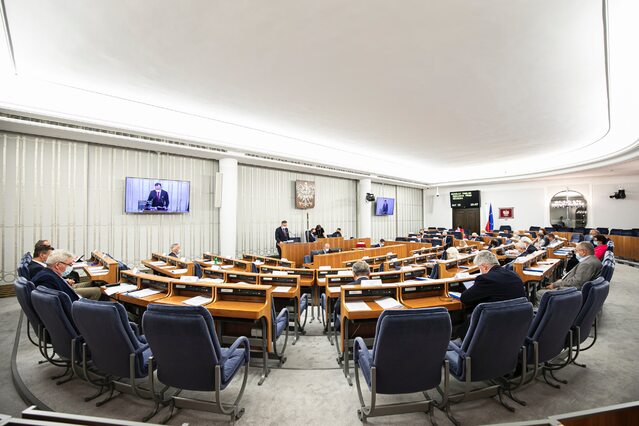 Obrady Senatu / Źródło: Twitter / Senat RP
Obrady Senatu / Źródło: Twitter / Senat RP
 Reprywatyzacja. Nie będzie zwrotu nieruchomości. Senat odrzucił pomysł umarzania spraw z urzędu
Reprywatyzacja. Nie będzie zwrotu nieruchomości. Senat odrzucił pomysł umarzania spraw z urzędu
Źródło: Rzeczpospolita
Senat wprowadził istotne poprawki do ustawy reprywatyzacyjnej. Główne zmiany zakładają m.in. umożliwienie dokończenia trwających jeszcze postępowań wszczętych po 30 latach od decyzji administracyjnej oraz wydłużenie vacatio legis ustawy do trzech miesięcy.
Propozycja ustawy nowelizującej Kodeks postępowania administracyjnego wywoływała wiele kontrowersji. Głos w sprawie zabrały Izrael i Stany Zjednoczone. Celem ustawodawcy było zakończenie szkodliwego procederu tzw. dzikiej reprywatyzacji, w wyniku której nieruchomości w różnych miastach były w podejrzanych okolicznościach przejmowane niekiedy przez osoby, które nie miały związków z przedwojennymi właścicielami nieruchomości.
Nie będzie umorzenia toczących się spraw z mocy prawa
Projekt przegłosowany przez posłów doprowadził do interwencji dyplomatycznej Izraela i Stanów Zjednoczonych. Co tak bardzo nie spodobało się tym państwom? Nowelizacja dotyczy art. 156 par 2 oraz 158 kodeksu postępowania administracyjnego, a która ma wdrożyć orzeczenie Trybunału Konstytucyjnego z 2015 r. Stwierdził w nim, że przepisach powinien się znaleźć okres przedawnienia roszczeń wobec decyzji wydanych z naruszeniem prawa, takich jak m.in. niesłuszne odebranie mienia.
Pierwotnie nowelizacja proponowała w takim przypadku 30-letni okres. Oznaczałoby to, że roszczenia dotyczące mienia żydowskiego odebranego w czasie II wojny światowej (która skończyła się już ponad 70 lat temu) nie mogłyby podlegać dalszemu procedowaniu.
Tym samym ustawa przewidywała, że toczące się obecnie postępowania administracyjne o stwierdzenie nieważności decyzji administracyjnych wydanych w okresie PRL miałyby ulegać umorzeniu z mocy prawa. W rezultacie spadkobiercy, którzy od lat próbują odzyskać majątek, zostaliby z niczym, a przecież przeciągające się procedury mogą być wynikiem okoliczności przez nich niezawinionych.
– Zakończeniu podlegałyby postępowania często prowadzone od kilkudziesięciu lat ze względu na opieszałość organów administracji publicznej. W praktyce bez merytorycznego rozpoznania. Strony, które pokrywały przez lata honorarium swoich pełnomocników, zostałyby poinformowane, że nie doczekają się żadnego rozstrzygnięcia – ani pozytywnego, ani negatywnego – powiedział w rozmowie z „Rzeczpospolitą” radca prawny Maciej Machlejd zajmujący się prawem nieruchomości.
Poprawka Senatu umożliwia dalsze prowadzenie postępowań już wszczętych. Nie będzie więc przewidzianego przez Sejm obowiązkowego umorzenia postępowań, które zostały wszczęte co najmniej 30 lat wcześniej. Senacka poprawka umożliwia zakończenie takich postępowań stwierdzeniem wydania decyzji z naruszeniem prawa i wskazaniem okoliczności, z powodu których nie stwierdzono nieważności decyzji.
Tylko odszkodowanie, a nie zwrot w naturze
Senatorowie podtrzymali natomiast poprawkę mówiącą o tym, że spadkobiercy nie mogą domagać się zwrotu nieruchomości, a jedynie odszkodowania.
Inna poprawka zakłada wydłużenie vacatio legis do trzech miesięcy (z dotychczasowych 30 dni), co oznacza, że osoby, które dotychczas nie wszczęły jeszcze postępowań, będą miały na to jeszcze czas.
Nowelizacja wróciła do Sejmu i nie ma pewności, czy posłowie utrzymają poprawki w mocy.
Zawartość publikowanych artykułów i materiałów nie reprezentuje poglądów ani opinii Reunion’68,
ani też webmastera Blogu Reunion’68, chyba ze jest to wyraźnie zaznaczone.
Twoje uwagi, linki, własne artykuły lub wiadomości prześlij na adres:
webmaster@reunion68.com




 Żydowski Instytut Historyczny
Żydowski Instytut Historyczny